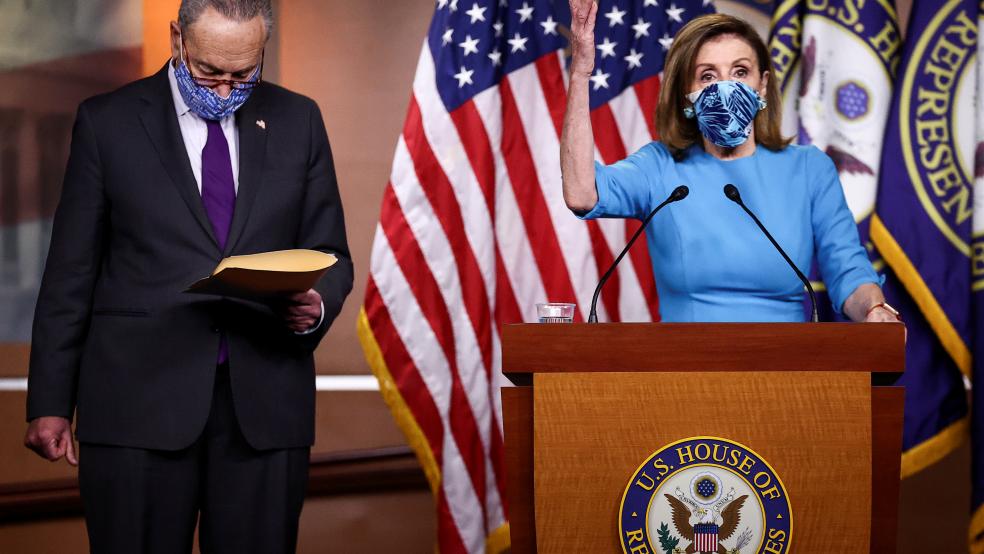The players in the coronavirus stimulus negotiations may be changing, but the stalemate remains the same.
The Trump administration is reportedly stepping back from the talks, leaving it to Senate Majority Leader Mitch McConnell (R-KY) to try to hammer out a compromise with House Speaker Nancy Pelosi (D-CA). Treasury Secretary Steven Mnuchin had been leading negotiations with Pelosi on a package approaching $2 trillion, but those talks collapsed before the election.
“There hasn’t been any discussion yet between McConnell and Pelosi, but McConnell is not going to rely on Mnuchin anymore to do the dealing,” Sen. Chuck Grassley (R-IA) told reporters on Thursday morning. “I think he’s intending to take it over and try to get something going.”
The gap between the parties remains as cavernous as ever.
Pelosi and Senate Minority Leader Chuck Schumer (D-NY) spoke about the negotiations with President-elect Joe Biden Thursday. “They discussed the urgent need for the Congress to come together in the lame duck session on a bipartisan basis to pass a bill that provides resources to fight the COVID-19 pandemic, relief for working families and small businesses, support for state and local governments trying to keep frontline workers on the payroll, expanded unemployment insurance, and affordable health care for millions of families,” according to a joint statement.
While the statement didn’t address the costs of a relief bill, Pelosi and Schumer told reporters Thursday that, given the surge in Covid-19 cases across the country, they will continue to insist on package totaling more than $2 trillion, far larger than what Republicans have suggested. The Democratic leaders insisted that voters had given them and Biden a mandate to pursue a more comprehensive deal.
“This election was maybe more a referendum on who can handle Covid well than anything else,” Schumer said. “The Donald Trump approach was repudiated and the Joe Biden approach was embraced. That is why we think there is a better chance of getting a deal in the lame duck.”
McConnell quickly burst that bubble, again rejecting the idea of a multitrillion-dollar package. "My view is the level at which the economy is improving further underscores that we need to do something about the amount that we put on the floor in September and October — highly targeted at what the residual problems are," he said, referring to a roughly $500 billion package Senate Republicans had proposed. “I gather [Pelosi and Schumer] are looking at something dramatically larger. That’s not a place I think we’re willing to go. But I do think there needs to be another package. Hopefully we can get past the impasse we've had now for four or five months and get serious about doing something that's appropriate.”
Schumer, meanwhile, called McConnell’s proposal for a narrower bill a “non-starter” and Pelosi said Republicans were being cold-hearted about the crisis. “It’s like the house is burning down and they just refuse to throw water on it,” she said.
What’s next: While talks haven’t started again, Pelosi reportedly has spoken to Senate Appropriations Chair Richard Shelby (R-AL) about a stimulus deal and government funding bill needed by December 11. McConnell said this week that he plans to discuss the funding bill with Pelosi.
The speaker faces some pressure to get something done from centrists in her party, and some Democrats reportedly worry that waiting to pass another relief bill could hamstring the incoming Biden administration. But with Republicans hopeful that they will maintain control of the Senate and some Democrats hopeful that they can get a better deal once Biden takes office, neither side appears to have much incentive to reach an agreement during the upcoming lame-duck session of Congress.
The bottom line: “Prospects for a new stimulus bill this year just about hit rock bottom on Thursday,” Politico’s Burgess Everett and Sarah Ferris write. For what it’s worth, analysts at Goldman Sachs continue to expect that Congress will approve another stimulus package of roughly $1 trillion, but say that’s more likely to happen early next year. They say it’s increasingly likely that Congress will add some targeted stimulus measures to the spending bill it will need to pass next month to avoid a government shutdown, pushing additional action on coronavirus relief into 2021 — and making the size of that action dependent on the course of the pandemic and vaccine development.





